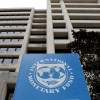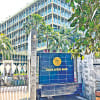Implement market-driven exchange rate fast: IMF

The International Monetary Fund (IMF) yesterday suggested that banks in Bangladesh should quicken the implementation of market-driven exchange rates as it would help alleviate the ongoing foreign currency crisis.
The IMF came up with this suggestion during a meeting between visiting IMF delegates and the chief executives of six private commercial banks in the country.
Led by its mission chief for Bangladesh, Rahul Anand, the IMF delegation met with the officials as a part of their review on whether the country is meeting the conditions for a $4.7 billion loan.
The review was initiated on October 4 this year.
The chief executives of Brac Bank, Prime Bank, Dutch-Bangla Bank, City Bank, Mutual Trust Bank and Eastern Bank were present at the meeting, held at the Brac Bank head office in Dhaka.
The meeting discussed various issues of the local banking sector with the IMF delegation focusing on three major areas, namely exchange rates, lending rates and non-performing loans, The Daily Star learnt from participants.
They informed that the IMF realises this is an election year for Bangladesh and that is why there has been a delay in implementing reforms outlined by the global lender.
The IMF had given six major conditions to Bangladesh for availing the $4.7 billion loan in October 2022.
These conditions included allowing the market to dictate lending and exchange rates, and keeping the net forex reserve at $24.46 billion as of June this year.
And having met most of the conditions, it is expected that the second tranche of the loan will be released within December.
After the meeting, Brac Bank Managing Director Selim RF Hussain told The Daily Star that it was a short meeting.
"We informed the delegation about our plan for the exchange rate," he said, adding that there are multiple rates in the forex market but they recently implemented a uniform one.
"Now there are two rates. One is the buying rate and the other is the selling rate," added Hussain, also chairman of the Association of Bankers, Bangladesh (ABB).
Hussain informed that the IMF delegation said the local economy is on track as a majority of the reforms have already been met.
The ABB leader said another area of discussion was the lending rate.
"We informed them that the central bank withdrew the lending rate cap and introduced a new lending rate system, which is helping to raise the lending rate," he added.
Now, the central bank is trying to tackle skyrocketing inflation in the country by raising the policy rate.
As per Bangladesh Bank's new interest rate formula, banks in the country can impose a 3.5 percentage point margin on the six-month moving average rate of treasury bills, abbreviated as SMART.
The SMART was 7.20 percent in September and it will be applicable for October, up from 7.14 percent in August.
Hussain said the IMF delegation urged for faster implementation of reforms in the banking sector and also wanted to know about the condition of non-performing loans.

 For all latest news, follow The Daily Star's Google News channel.
For all latest news, follow The Daily Star's Google News channel. 








Comments